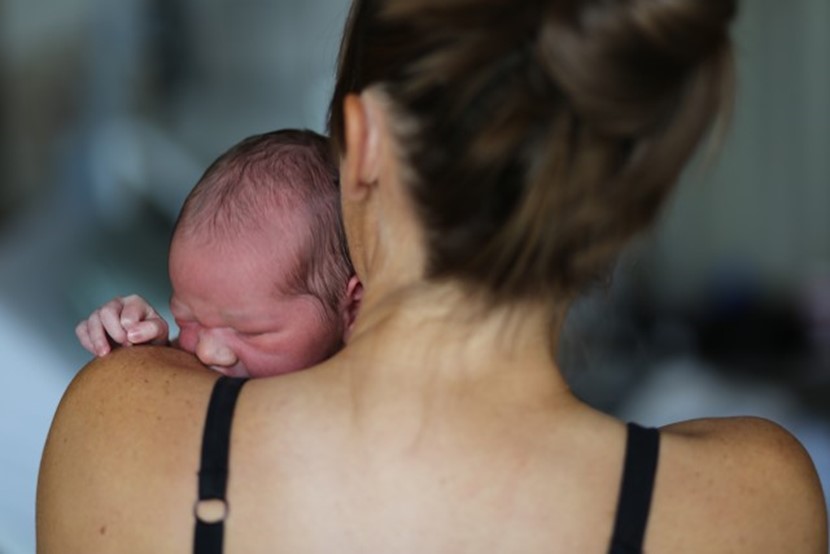Is it normal to get chills and shakes after giving birth?

Along with the sweet relief of not having to push anymore and the joy of finally holding your baby, you may experience a lesser-known phenomenon – postpartum shakes. We want to say right off the bat that this is perfectly normal even though it’s not talked about often. In fact, a study that took into account the birth experiences of 50 healthy women reported that 44% of them had shivering set in during labour or within half an hour post-delivery. Because this phase is not often explained to new mothers, it comes as a surprise when they experience it.
What are postpartum chills?
The changes that your body goes through during the three stages of labour are intense and strenuous. Even after the baby is born, your body will be adjusting to the new situation. This includes a rush of hormones and the shifting of fluids. The shakes and chills are believed to be your body’s reaction to these changes. Some women even experience it during the transition stage of labour. Postpartum chills and shakes can happen whether you’ve had a C-section or a vaginal birth.
What do postpartum chills feel like? What should you do?
These chills and shakes can be described as an intense bout of shivering. Some women even report their teeth chattering during this experience. It is not a pleasant feeling and you may feel awkward or uncomfortable. Your nurses or midwives, who are familiar with this scenario, will help keep you warm and comfortable by bundling you up in blankets. The best thing to do is to just ride it out, don’t strain yourself trying to stop it. Straining your body to control the shivers can strain your C-section stiches if you have them. The chills commonly pass within in an hour. It is key to stay warm, safe, relaxed and to keep yourself hydrated.
Why do you shake after giving birth?
If you get them, you’ll usually get the chills within two hours of childbirth. The current understanding is that your hormones are largely responsible for this phenomenon – especially the adrenal hormones. It could also be a reaction to the anaesthesia that you’ve been given or a release of endorphins.
The amount of exertion required to push your baby out during labour is quite high. This causes your body temperature to rise. Once the baby emerges and you stop pushing, the body tries to regulate and normalise this temperature, inducing the shivering. So, exertion of childbirth is also believed to be a contributor to this phenomenon.
A study conducted specifically to observe this post-delivery chills and shakes noted that severity and extent of the shivering can be attributed to a number of factors including temperature and fluctuating hormones, there is no one exact cause.
And if you’re wondering whether this happens every time you give birth, the answer is yes. Since your body will go through the rush of hormones, the changes and the exertion through every birthing cycle, you’re likely to get the shivers for each one as well. But once you know what to expect, you can prepare yourself for it and make the experience less worrying with the support of your loved ones and your medical team.
Is it normal to have shakes days after delivery? When should I be worried?
The postpartum shakes generally set in within two after the birth. It is considered to be normal as long as it is not accompanied by a fever. Assess whether your chills feel like those you experience when you have the flu – is there an ache that you can feel in your bones? If this is the case, or you have a temperature, this could be a fever that indicates an infection. You should tell your doctor or nurse about this immediately.
You should mention it to your doctor if the chills continue even after you get home. Or if the chills set in after you’ve been discharged and are home with your baby. When you feel the chills, notice if you are also experiencing symptoms like cold clammy skin, dizziness, a racing heart, any shortness of breath, uncontrolled bleeding or even heart pain. These indicate a condition known as shock and will need immediate medical attention.
Another reason for shivering could be mastitis, which is the inflammation of breast tissue caused by an infection. The symptoms of mastitis include chills, fever, pain in the breast, inflamed tissue and redness on the breasts. Lactation mastitis is common in women who are breastfeeding. It should be brought to your doctor’s attention right away.
How do I make sure my baby is safe post-delivery?
Many women worry that the shakes will affect their baby. But as long as your child is not in danger of being dropped it should be fine. To reduce risks and put your mind at ease, after the delivery hold your baby when you’re in the lying down position. Place the baby on your chest in the skin-to-skin position. This way you can minimise the role of your arms in supporting your baby and he or she is not in danger of falling. As extra precautions, you can have your loved ones stand on either side of the bed and raise the railings of the hospital bed. Doctors often recommend cuddling with your baby to create a sense of comfort for both mum and child – a cuddle is good for you both.

